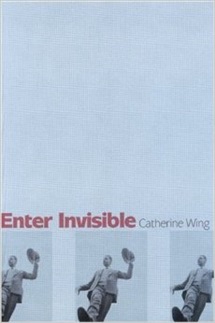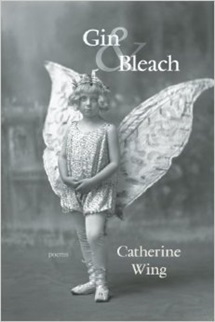This article first appeared as a post titled "Best Thing I’ve Heard/Read This Week: Catherine Wing" at Vouched Books on 31 January 2014.


In “How It All Fell Out,” the final poem of Gin & Bleach—Catherine Wing’s second full-length collection of poetry—the speaker observes how the “mouths” of an unspecified “they”: “stretched as if to say open, they were outspoken, they let the light pour through, and the air pour through, and that which was neither light nor air they were open to” (57).
This passage, I think, provides a productive way to conceptualize Wing’s poems: open mouths that consume the world around them, whether it be in the form of “light” or “air” or that which is “neither,” in order to, later, articulate that aforementioned world in an “outspoken” fashion. In other words, the poems function similar to breath, wherein the speaker inhales her surroundings so as to exhale them. The exhalations find their form, most notably, in song. Yes, everywhere there is song: the “song of oyster-shell,” the “song of sifted flour,” the “song of meadowlark” (47), the “Song sung of a splash” (26) by a tadpole, the “Cobbled Song,” the “Death” song, the “Night Song,” and any number of the “Counting Songs” found throughout Gin & Bleach.
The songs that we hear “swinging on a string of sound” (23) within Gin & Bleach are more than just pleasant music—though they are that as well; but, indeed, they also search or strive for something more, which is ineffable, ethereal, and protean. Stated differently, these poems are “searching the lexicon // for a soul” (28): something to guide and direct us, however vague or amorphous that concept may be.
This, of course, is no easy task, because “Language,” as Wing writes, “is, at best, a guessing game” (15) wherein we can only really know “somewhat what” (14) we think we mean to write. Which, I take to mean, we never really know what we mean to write, even if we mean something that we think we mean; which, yes, could mean that we mean nothing at all.
Similar to when “birds unlace their songs” (4) into the atmosphere around us, we think less about what their songs mean, and, rather, simply enjoy the beauty of their music. To this extent, what I enjoy most about Wing’s collection is the ability of the poems therein to straddle that line between meaning and non-meaning, sense and nonsense, all in service of the song.
Below, watch Wing read her poem "The Evil Hypnotist Plans His Next Session" from the event:
Upcoming events for the Poets of Ohio reading series include Matt Hart (02.06), Heather Christle (02.13), Dave Lucas (03.18), Tyrone Williams (03.27), and Larissa Szporluk (04.10) For more information on these events, check out the following Internet Web-Page.


In “How It All Fell Out,” the final poem of Gin & Bleach—Catherine Wing’s second full-length collection of poetry—the speaker observes how the “mouths” of an unspecified “they”: “stretched as if to say open, they were outspoken, they let the light pour through, and the air pour through, and that which was neither light nor air they were open to” (57).
This passage, I think, provides a productive way to conceptualize Wing’s poems: open mouths that consume the world around them, whether it be in the form of “light” or “air” or that which is “neither,” in order to, later, articulate that aforementioned world in an “outspoken” fashion. In other words, the poems function similar to breath, wherein the speaker inhales her surroundings so as to exhale them. The exhalations find their form, most notably, in song. Yes, everywhere there is song: the “song of oyster-shell,” the “song of sifted flour,” the “song of meadowlark” (47), the “Song sung of a splash” (26) by a tadpole, the “Cobbled Song,” the “Death” song, the “Night Song,” and any number of the “Counting Songs” found throughout Gin & Bleach.
The songs that we hear “swinging on a string of sound” (23) within Gin & Bleach are more than just pleasant music—though they are that as well; but, indeed, they also search or strive for something more, which is ineffable, ethereal, and protean. Stated differently, these poems are “searching the lexicon // for a soul” (28): something to guide and direct us, however vague or amorphous that concept may be.
This, of course, is no easy task, because “Language,” as Wing writes, “is, at best, a guessing game” (15) wherein we can only really know “somewhat what” (14) we think we mean to write. Which, I take to mean, we never really know what we mean to write, even if we mean something that we think we mean; which, yes, could mean that we mean nothing at all.
Similar to when “birds unlace their songs” (4) into the atmosphere around us, we think less about what their songs mean, and, rather, simply enjoy the beauty of their music. To this extent, what I enjoy most about Wing’s collection is the ability of the poems therein to straddle that line between meaning and non-meaning, sense and nonsense, all in service of the song.
Below, watch Wing read her poem "The Evil Hypnotist Plans His Next Session" from the event:
Upcoming events for the Poets of Ohio reading series include Matt Hart (02.06), Heather Christle (02.13), Dave Lucas (03.18), Tyrone Williams (03.27), and Larissa Szporluk (04.10) For more information on these events, check out the following Internet Web-Page.

No comments:
Post a Comment